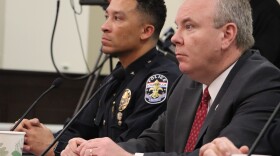The nonpartisan organization analyzed seven of Kentucky’s 60-day legislative sessions over a 25-year period and found a dramatic increase in what it calls “maneuvers that undermine citizen participation.”
Becky Jones, the first vice president of the organization, stopped short of questioning the legality of such tactics, but said they undermine the core principles of democracy.
“When fast-track maneuvers take place, the public is left to wonder, what is the rush? Is there concern that legislation can't stand up to public scrutiny or comment before it's passed into law?” Jones said at a news conference Wednesday. “Government should support citizen participation, not inhibit it.”
In 1998, the first year the report analyzed, lawmakers used one of four fast-tracking maneuvers for less than 5% of bills that later became law. In 2022, that number had increased to 32% of successfully passed bills originating in the House and 24% of successful bills originating in the Senate.
The report identified four key ways in which legislators fast-track proposals without providing substantive opportunity for public feedback:
- Allowing bills be “read”— that is, formally announced on the House or Senate floor — before they are finalized in committee. The state Constitution requires three readings before a bill can pass the full House or Senate, but lawmakers frequently dispatch with those readings before the final language of a bill reaches the floor, leaving significant room for last-minute changes.
- Committees substituting entirely new language into a piece of legislation at the last minute, without giving stakeholders notice or time to prepare comments or concerns. The new language is often not available to the public and minority party members by the time a committee meeting begins.
- Taking a floor vote within a day of a committee passing a bill, sometimes with substantial last-minute changes. This is only possible if the first tactic was employed, which allows for readings of the bill before it is finalized by a committee.
- Taking a floor vote the same day a free conference committees finalizes a bill. When the House and Senate pass different versions of a bill, the two chambers can send members to join a “free conference committee,” which can create new provisions and wording in the bill without public input.
In several high profile cases, several of the tactics were combined, making public participation and transparency extremely difficult. It also makes it difficult for lawmakers to keep up with the pace of quickly changing legislation, the report alleged.
Jones noted that she doesn’t believe individual legislators are to blame or that it is a matter of party affiliation.
“I correspond with legislators on a regular basis. And I have wonderful legislators who respond each and every time I raise an issue with very thoughtful responses. They are great examples of how to represent the people,” Jones said. “I just wish there was more of that in the day-to-day activity of the House and the Senate.”
Several controversial pieces of legislation were passed with one or more of the fast-track tactics in recent years.
During the 2018 session, changes to the state’s pension system were affixed to an unrelated wastewater bill and passed by both chambers in a matter of hours. It was later struck down by the Kentucky Supreme Court due to the manner legislators passed it.
This year, GOP lawmakers fast-tracked Senate Bill 150, the bill banning gender-affirming medical care for trans youth and creating restrictions around how sexuality and gender identity are discussed in the classroom. Though controversial elements of the bill initially failed to pass the Senate, they were added back in at the last minute during a surprise committee hearing in the House. The bill’s language was significantly altered after it was sent to the House, where a committee added back in controversial elements, including a medical ban on gender-affirming care for minors.
Cindy Heine, one of the League of Women Voters researchers, called for the legislature to amend its rules to cut down on fast-tracking and allow more citizen participation. She said she would be following the first week of the session, which begins Jan. 2, 2024.
“On the very first day of the session, they introduce the rules … and they're passed by voice vote as a resolution. So they're not officially law, but they are the rules that they follow. What will be interesting is to see if those rules change,” Heine said. “We hope that they will.”
Jones said she recognizes sometimes there is a good reason to fast-track legislation, like in the face of a true emergency.
“There are certain circumstances where legislation should be pushed forward quickly. And we can all go back to natural disasters, emergency situations where the legislature is doing the best and the right thing for the citizens of Kentucky to move especially money through that process,” Jones said.
But, she noted, that does not account for the steady increase over decades in fast-tracking methods in recent years.
Republican leaders of the House and Senate did not immediately respond to a request for comment.





